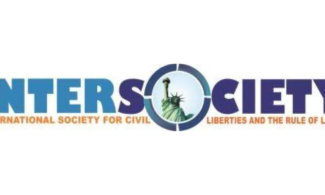
This development has now exacerbated insecurity across the country, which according to the report, is punctuated by ongoing killings and the operational death code to military and police chiefs in Eastern Nigeria.
A report by the International Society for Civil Liberties and Rule of Law (Intersociety), a civic group, has revealed how an alleged quest by former President Muhammadu Buhari's administration to create state extremism led to the springing up of over 50 mostly government-linked armed groups since 2015.
This development has now exacerbated insecurity across the country, which according to the report, is punctuated by ongoing killings and the operational death code to military and police chiefs in Eastern Nigeria.
The report signed by the principal officers of Intersociety was titled: "Quest For State Jihadism By Former Government Of Muhammad Buhari Had Created Over 50 Mostly Government-linked Armed Groups Since 2015, Leading To The Issuance Of The Alleged C-in-C’s Above The Law License On Jihadist Fulani Herdsmen And Operational Death Code In Eastern Nigeria; Joined By Over-Bloated Govs’ Security Votes And Security Sector Corruption To Trigger And Fuel Unchecked Insecurity And Other Unsafe Conditions In Nigeria’s Six Geopolitical Regions."
The report noted that the new reality had brought about unchecked insecurity and other unsafe conditions in Nigeria’s six geo-political zones of North-East, North-West, North-Central, South-West, South-South, and South-East.
According to the report, Nigeria had three main armed groups before May 2015 when President Muhammadu Buhari was elected Nigeria's President. Regrettably, the three armed groups had grown to 50 as of July 2023.
"It must be remembered that Nigeria was home to three major jihadist armed opposition groups in May 2015 including Boko Haram, ANSARU (Movement for the Protection of Muslims in Black Africa) and Fulani Herdsmen militias."
It noted that eight years after Buhari's regime, the number of armed opposition groups spread across the country with different factions or splinters within some groups had doubled.
"Within Jihadist Fulani Bandits alone, there are more than 15 splinter groups and among the Jihadist Fulani Herdsmen, there are over five including indigenised Fulani Jihadists and regionally assembled Jihadists comprising Fulanis from neighboring African countries, Shuwa Arab and Bagara Jihadists, among others.
"There are also groups of Al-Qaeda-allied Jihadists and Jihadist Mercenaries assembled from failed Republics of Libya and Sudan and Maghreb Africa. It must be noted that there is ongoing “Fulani Islamic Jihadism” across Africa, responsible for jihadist attacks in Christian-dominant countries of Mozambique, Ivory Coast, Democratic Republic of Congo, Congo Republic, Cameroon, Benin Republic, Burkina Faso, Central African Republic (Seleka Islamic Revolutionaries), Namibia, Uganda, etc and Muslim dominant countries of Niger, Chad, Mali, Guinea, Senegal, etc.
"Among the over 50 armed opposition groups found to be triggering insecurity and other unsafe conditions in Nigeria are the Islamic State insurgents and others linked to Al-Qaeda, numbering over five including ISWAP. Going by recent revelations by Alhaji Mujahadeen Asari Dokubo (ex-Niger Delta chief militant-turned-radical Islamist), there are now Jihadist Niger Delta militants linked to the Nigerian Government wreaking havoc Old Middle-Belt, especially Benue and Plateau States and South-East States of Imo, Ebonyi, and Anambra, etc through the governors of those States and Federal Government of Nigeria."
The report also revealed that within the eight years of Buhari's regime, over 20 armed killer entities were enthroned in the South-East region alone, which accounted for the surge of insecurity in the region.
The report traced some of these armed entities to some states' governments that profit from insecurity by increasing "unaccounted security vote".
"Openly linked to the Governments of Imo and Ebonyi, for instance, are the “Ebubeagu killer Vigilante Groups”; formed in April 2021. In Anambra and Abia, there are “Anambra and Abia Vigilante Groups” engaging in sundry atrocious conductor services of the ex-Niger Delta militants have also been secured to swell the ranks of killer entities in the South-East and Igbo part of the South-South.
"For instance, our gathered intelligence in 2022 indicated that the services of ex-Niger Delta militants were secured by the Government of Anambra State under Prof Charles Soludo in 2022 and were placed under the operational control of one of the federal security formations in the State and quartered in some local government headquarters including Aguata and Nnewi South. Former ex-chief militant, Asari Dokubo may be contacted for the rest of the story.
"In Imo and Ebonyi, the ex-Niger Delta militants are strongly suspected to be part of the killer entities through the instrumentalities of the atrocious Ebubeagu Vigilante Groups. It is also strongly suspected the ed that the South-East is presently troubled by the jihadist activities of the duo of the Jihadist Fulani Herdsmen and the MACABAN’s Fulani Vigilante Groups (strongly suspected to have been peopled by “repented and un-repentant” Boko Haram insurgents and Fulani Jihadists).
"The MACABAN’s Fulani Vigilante Groups are strongly suspected to have been deployed in various secret locations in the South-East and South-South under heavy protection and complicity of the country’s security forces."
In the 17-page report, Intersociety called on President Bola Tinubu's led-Government of Nigeria to urgently reverse and discontinue “the alleged Buhari’s above the law license” on Fulani Jihadists/State Jihadism in Nigeria.
The group also charged the government for "urgent investigative interventions by the United Nations High Commissioner for Human Rights through the UN’s Special Rapporteurs on Extrajudicial and Summary Executions or Killings; Enforced Disappearances; Torture/Other Inhuman and Degrading Punishments or Treatments; Arbitrary Arrests/Detentions; Environment and Human Rights; and Right to Adequate Housing or Shelter to as the enormity or gravity of human rights abuses and violations connected to all of the above; identify their human and material victims and the non-state actors and the non-state actor non-state responsible or involved."